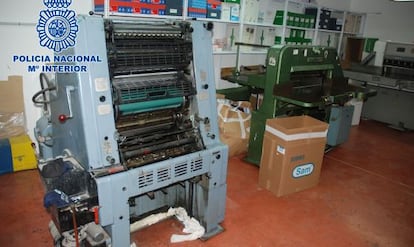67,000 phony magazines to cover up a €15 million fraud
Spanish police foil ad-space scam that tricked thousands of small businesses over 13 years

Using an old press at an industrial warehouse in Elche in Alicante province, a group of con artists printed 67,000 phony magazines over 13 years as part of an ad-space scam that tricked thousands of unsuspecting businesses.
The magazines were purportedly published by police associations, the army, and non-profit groups working with the disabled, investigators said.
Each publication was said to have between 30 and 40 ad spaces, each costing between €150 and €400, depending on their size and page location.
But the magazines had no real circulation: the only copies ever printed were the ones sent to the clients who took out ads.
The alleged ring leader is a Valencia businessman described by police as an expert motivator
Between 2001 and 2014, the ring managed to extract €15 million from more than 150,000 self-employed workers and small businesses across Spain.
The magazine content was obtained by plagiarizing information from official sources and by interviewing real police officers who were also convinced that the magazines were real. The publications were full of National Police and Civil Guard logos and badges, and the ring used the names of the Civil Guard Radio Amateur Association (ACRAG) and the National Police’s Santo Ángel Radio Amateur Association (ARSA), which do exist but have no connection to the scam.
A National Police raid yielded 52 arrests (49 of them in Elche), €46,000 in cash, four vehicles and computer files. One server was found behind a double ceiling inside an office. Investigators blocked 32 bank accounts and identified several front men, many of them elderly people in financial difficulties who were unaware of what they were signing.
The alleged ringleader is Valencia businessman Antonio Pascual Fernández Muñoz, who is now under investigation for fraud, criminal association and money laundering. Investigators said Fernández Muñoz also controlled several real estate firms and a telephone marketing company to help cover up the fraud. The ill-gained money was transferred between his businesses using fake invoices and used to pay bonuses to the phone operators who sold the ad space for him.
The only copies ever printed were the ones sent to the customers who took out the ads
Police have described Fernández Muñoz as an expert motivator who organized parties for his employees and rewarded those who closed the most sales. There were more than 100 telephone lines at their service, and targets included small businesses from all sectors that the group found in the phone book and local brochures.
What the police failed to find during the raid was a single contract. Salespeople offered their targets “collaborations” with police magazines.
“In order to secure clients on a massive scale. they used telemarketing techniques that were illicit, authoritarian and even coercive,” explains a police report.
But complaints began to be filed as early as 2006, and in March 2010 Valencia public television aired a program in which a hidden camera exposed the way the ring worked. In 2012, the police investigation began moving faster, and the ring was busted in June of this year, ending its plans to expand into Central America. A judge lifted the gag order on the proceedings this week.
Tu suscripción se está usando en otro dispositivo
¿Quieres añadir otro usuario a tu suscripción?
Si continúas leyendo en este dispositivo, no se podrá leer en el otro.
FlechaTu suscripción se está usando en otro dispositivo y solo puedes acceder a EL PAÍS desde un dispositivo a la vez.
Si quieres compartir tu cuenta, cambia tu suscripción a la modalidad Premium, así podrás añadir otro usuario. Cada uno accederá con su propia cuenta de email, lo que os permitirá personalizar vuestra experiencia en EL PAÍS.
¿Tienes una suscripción de empresa? Accede aquí para contratar más cuentas.
En el caso de no saber quién está usando tu cuenta, te recomendamos cambiar tu contraseña aquí.
Si decides continuar compartiendo tu cuenta, este mensaje se mostrará en tu dispositivo y en el de la otra persona que está usando tu cuenta de forma indefinida, afectando a tu experiencia de lectura. Puedes consultar aquí los términos y condiciones de la suscripción digital.








































